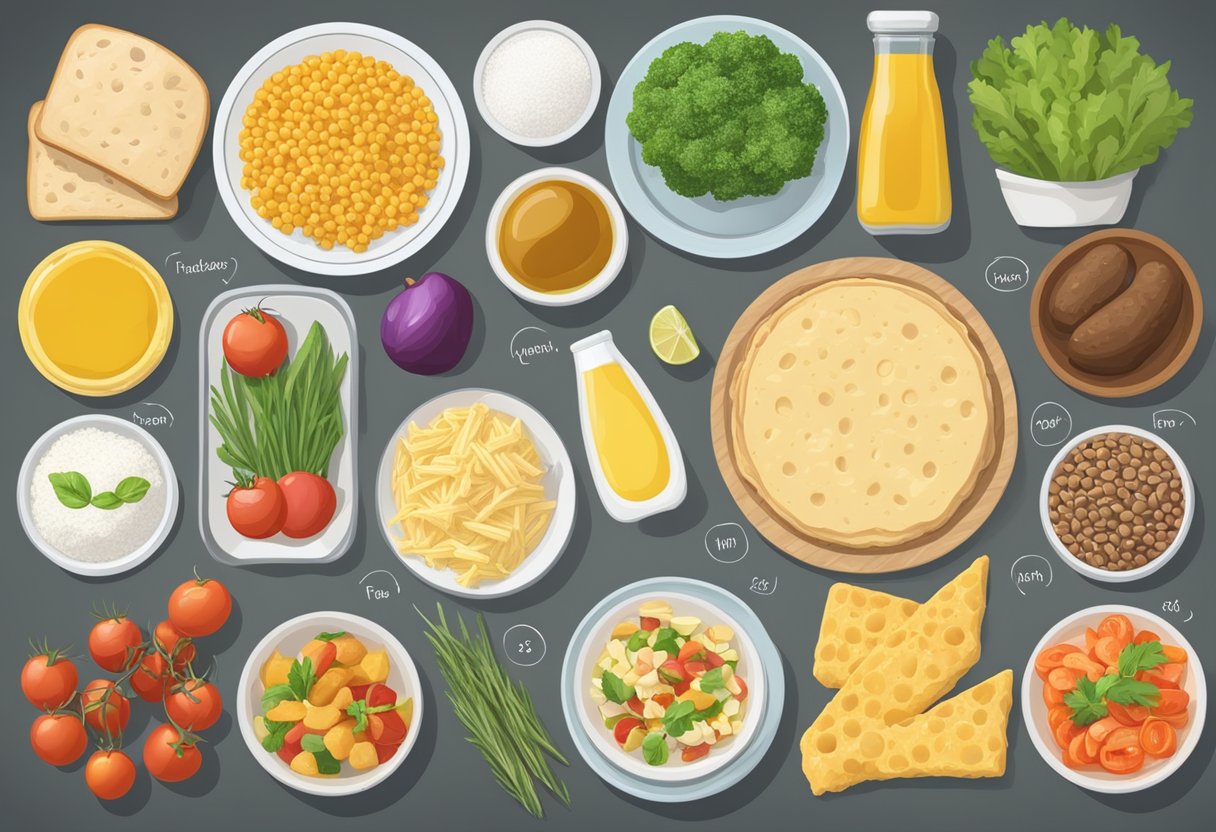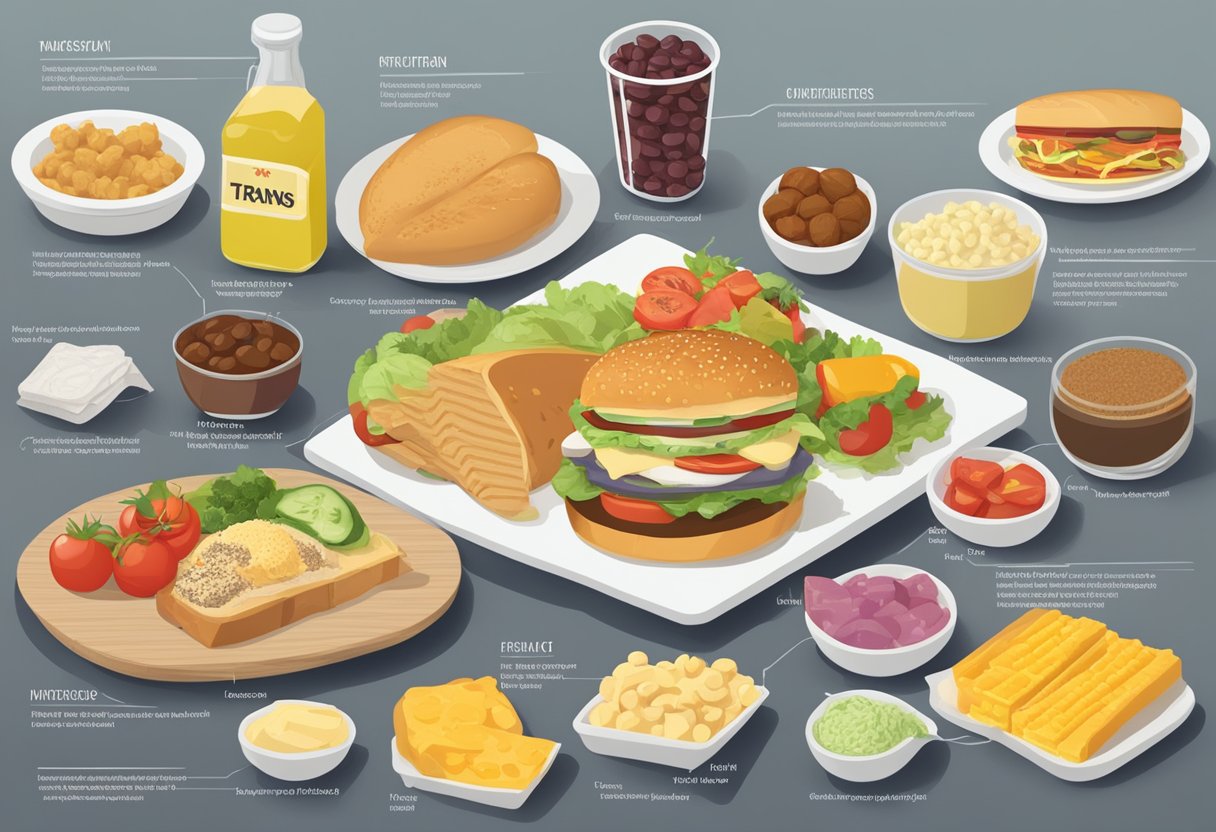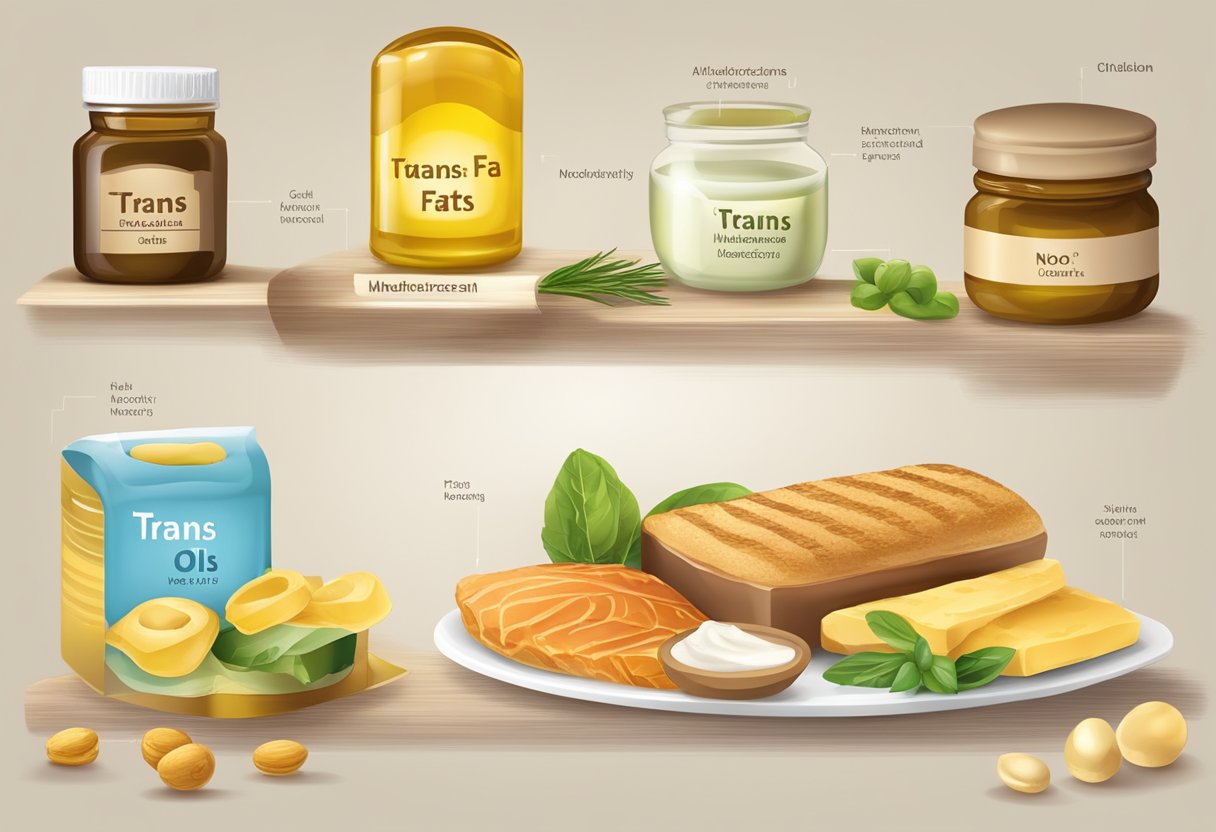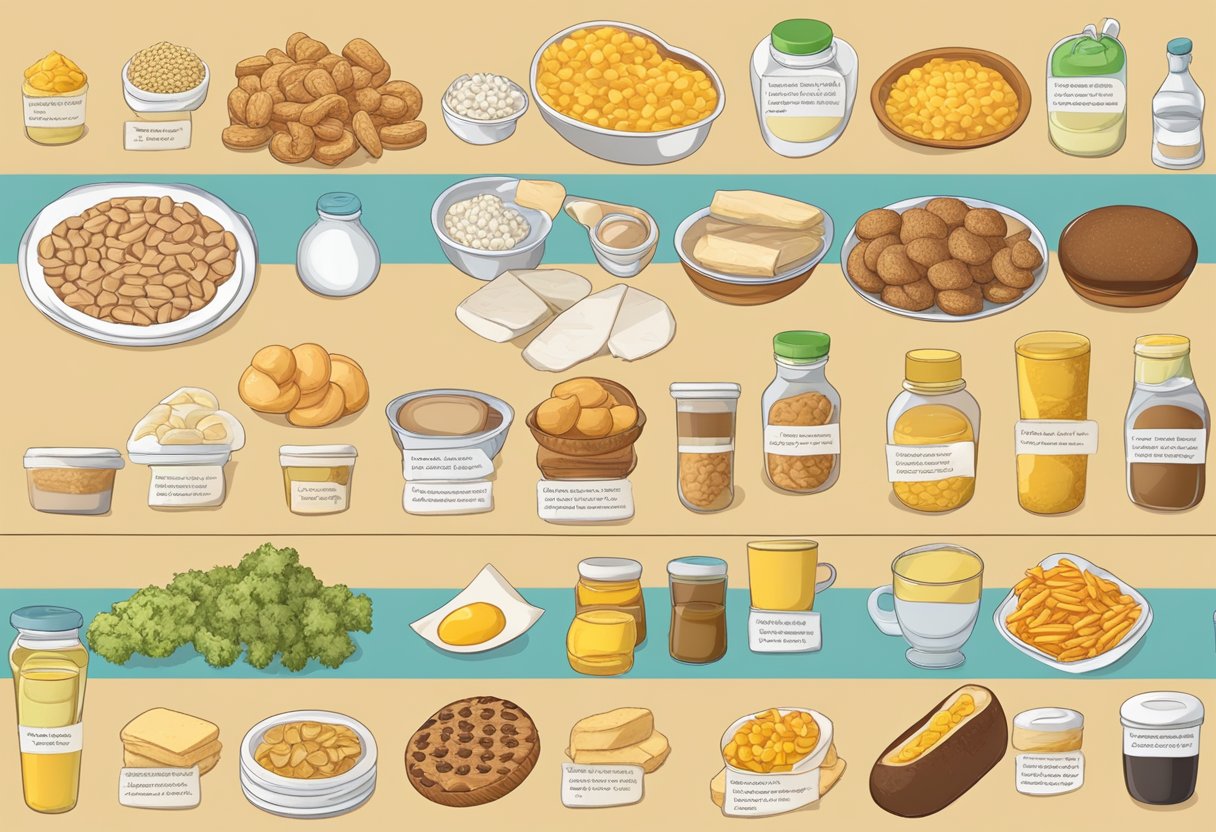In the pursuit of a healthier lifestyle, understanding the types of fats in our diet is crucial. Trans fats, a form of unsaturated fat, have been widely scrutinized for their adverse health effects. Artificial trans fats, created through industrial processes, are considered particularly harmful as they raise bad (LDL) cholesterol levels while reducing the good (HDL) cholesterol. This imbalance is associated with an increased risk of heart disease and diabetes.
A Mediterranean diet, praised for its heart-healthy qualities, emphasizes the consumption of beneficial fats, such as monounsaturated and polyunsaturated fatty acids, while steering clear of unhealthy fats like trans fats and excessive saturated fats.

The shift away from trans fats and other unhealthy fats has a profound influence on food industry practices, propelling manufacturers to reformulate products in favor of healthier alternatives. Consumers are becoming increasingly vigilant about the fats they include in their diets, opting for options more in line with Mediterranean principles.
Avoiding unhealthy fats is not only about excluding certain items but also about embracing whole, unprocessed foods that are naturally low in harmful fatty acids.
Key Takeaways
- Trans fats raise LDL cholesterol and lower HDL cholesterol, increasing the risk of heart disease.
- The Mediterranean diet focuses on healthy fats and excludes trans and excessive saturated fats.
- Industry and consumer behavior changes reflect a move toward healthier, Mediterranean-aligned eating patterns.
Table of Contents
Understanding Fats

Fats play a critical role in maintaining good health, yet not all fats are created equal. It’s essential to discern between beneficial fats that support the body and harmful fats that can contribute to heart disease.
Different Types of Fats
There are four major types of dietary fats, each with different chemical structures and physical properties:
- Saturated fats: Typically solid at room temperature, found in animal products and some tropical oils.
- Unsaturated fats: Liquid at room temperature and derive from plants. These are further divided into:
- Monounsaturated fats: Can help reduce bad cholesterol levels and are found in olive oil, a staple of the Mediterranean diet.
- Polyunsaturated fats: Include omega-3 fatty acids, which are beneficial for heart health. Sources include fish and flaxseeds.
- Trans fats: These are the result of hydrogenation, which solidifies liquid oils. They can be found in processed foods and have been linked to an increased risk of heart disease. The U.S. Food and Drug Administration (FDA) has taken steps to reduce artificial trans fats in the food supply since 2021.
Roles of Fats in the Body
Fats are an indispensable part of the human diet, fulfilling several functions:
- They are a major energy source, providing 9 calories per gram, more than carbohydrates or proteins.
- Fats aid in the absorption of fat-soluble nutrients and in the structure and function of cells.
- Fats are involved in hormone production and help maintain brain health.
Fats and Cholesterol
- Cholesterol is a type of fat that is crucial for cellular function but is harmful in excess.
- LDL (“bad”) cholesterol: Can build up in the arteries, increasing the risk of heart disease.
- HDL (“good”) cholesterol: Helps remove LDL cholesterol from the arteries.
- A balance of these is critical to maintain healthy cholesterol levels.
Historical Context
The views on fats have shifted over the years. In the past, all dietary fats were considered detrimental to health. More recent research differentiates between types of fats and their effects on health. The Mediterranean diet, rich in monounsaturated and omega-3 fats, is often highlighted for its health benefits, including reduced incidence of heart disease.
The Risks of Unhealthy Fats

Unhealthy fats, specifically trans fats and saturated fats, play a significant role in the development of chronic health conditions. They can manipulate cholesterol levels and increase the risk of cardiovascular diseases when not balanced properly with healthier unsaturated fats.
Trans Fats and Health
Trans fats are notorious for their negative impact on heart health. They can elevate LDL cholesterol (the “bad” cholesterol) and lower HDL cholesterol (the “good” cholesterol), leading to an increased risk of coronary artery disease. These artificial fats are also associated with a higher risk of stroke and type 2 diabetes. Trans fats can be found in some margarines, fried foods, and baked goods, making them a hidden danger in certain diets.
Saturated Fat and Disease
Consuming high amounts of saturated fats can raise total cholesterol and LDL cholesterol levels, contributing to the build-up of plaque in the arteries. This can lead to heart disease, and increase the likelihood of experiencing a cardiovascular event. Diets rich in saturated fats, such as those that include excessive amounts of red meat and full-fat dairy products, can also promote inflammatory responses and insulin resistance, aggravating the risk of developing type 2 diabetes.
Balancing Fats for Health
A Mediterranean diet, low in unhealthy fats and high in unsaturated fats like polyunsaturated fats and monounsaturated fats, supports optimal cholesterol levels and overall heart health. These fats can be found in olive oil, nuts, and fatty fish, and play a crucial role in reducing the risk of cardiovascular disease when they replace trans and saturated fats in the diet. It demonstrates a clear relationship between the right balance of dietary fats and the maintenance of health, particularly when aligned with Mediterranean dietary principles, which include a variety of plant-based foods and limited intake of processed products.
Sources of Unhealthy Fats

Understanding the types of foods that typically contain unhealthy fats, such as trans fats and saturated fats, is crucial for anyone looking to maintain a diet aligned with Mediterranean principles, which emphasizes heart-healthy fats.
Processed Foods High in Trans Fats
Processed foods are notorious for containing trans fats, which are created when hydrogen is added to vegetable oil—a process known as hydrogenation. This extends shelf life and improves the texture of food products. Examples include:
- Snack Foods: Often have partially hydrogenated oils, found in items like crackers, cookies, and microwave popcorn.
- Baked Goods: Many commercially baked products, such as pastries and pies, list partially hydrogenated vegetable oil as an ingredient.
- Fried Foods: Foods like French fries and fried chicken may contain trans fats from the hydrogenated vegetable oils used in their cooking processes.
Common Saturated Fat Foods
Saturated fats are primarily found in animal products and can contribute to heart disease. Foods rich in saturated fats include:
- Meat: Fatty cuts of beef, pork, and lamb.
- Dairy Products: High-fat dairy like whole milk, butter, and cheese.
- Tropical Oils: Although not animal-based, coconut oil and palm oil are high in saturated fats and often used in processed foods.
Label Reading and Types of Oils
Careful label reading can help identify unhealthy fats in food products. When reviewing labels, it’s important to look for:
- Words to Avoid: “Hydrogenated” or “partially hydrogenated” are indicators of trans fats presence.
- Oils to Limit: While canola, corn, safflower, and sunflower oils are common in processed foods, they should be used sparingly due to their high omega-6 fatty acid content, which can disrupt the omega-3 to omega-6 balance important in the Mediterranean diet.
- Healthier Options: In contrast, oils like olive oil and peanut oil are considered healthier choices and align with Mediterranean diet principles.
Avoiding Unhealthy Fats in Diet

Identifying and reducing the intake of unhealthy fats, such as trans fats and excessive saturated fats, is essential for a healthier lifestyle. These fats are known to increase the risk of heart disease and can conflict with the heart-healthy principles of the Mediterranean diet.
Alternative Healthy Fat Sources
In lieu of unhealthy fats, individuals can focus on incorporating healthy fats into their diet. These include:
- Monounsaturated Fats: Found in foods like avocado and olive oil.
- Polyunsaturated Fats: Include omega-3 fatty acids from fish like salmon and omega-6 from nuts and seeds such as walnuts.
One can easily replace a portion of saturated fats in their diet with these healthier options to align with the Mediterranean diet’s emphasis on heart health.
Cooking and Preparing Foods
When preparing meals:
- Opt to grill, bake, or steam rather than frying in unhealthy fats.
- Use olive oil or canola oil instead of butter or margarine.
- Incorporate ingredients such as nuts, seeds, and fish that are naturally high in healthy fats, while being mindful of gluten sensitivity.
Principles of the Mediterranean Diet
The Mediterranean diet focuses on:
- A high consumption of vegetables, nuts, seeds, and fish.
- Incorporating whole grains to support a gluten-free diet.
- Favoring healthy fats like olive oil over saturated fats and eliminating trans fats.
Embracing these principles not only supports cardiovascular health but also contributes to overall well-being.
Impact on Food Industry

The food industry has undergone significant changes due to increasing awareness of the health risks associated with certain fats, most notably trans fats. These shifts mirror the guiding principles of a healthier, Mediterranean approach, focusing on minimizing consumption of unhealthy fats which are associated with the risk of heart disease.
Regulations and Banning Trans Fats
The U.S. Food and Drug Administration (FDA) has taken decisive steps to protect public health by mandating the removal of artificial trans fats from the food supply. This stance aligns with recommendations from the American Heart Association to reduce the incidence of heart disease. Since June 18, 2018, companies are prohibited from adding artificial trans fats to their products.
Reformulation and Innovation
In response to these regulations, the processed food industry has pursued reformulation and innovation. The challenge lies in replacing trans fats, which contribute to desirable texture and shelf life, with alternatives that do not compromise product quality. Producers are shifting towards using fats that align with Mediterranean diet principles—favoring monounsaturated and polyunsaturated fats over saturated and trans fats.
Health and Nutrition Recommendations

Making informed choices about dietary fats is crucial for maintaining good health and adhering to a gluten-free Mediterranean diet. It is important to understand the types of fats to consume and avoid, especially trans fats and saturated fats, which are linked to an increased risk of heart disease and elevated cholesterol levels.
Guidelines from Health Organizations
The American Heart Association recommends that individuals limit their intake of trans fats as these are associated with higher LDL cholesterol—which is the ‘bad’ cholesterol—and an increased risk of heart attacks. Specifically, trans fats should constitute less than 1 percent of one’s total caloric intake. Fatty acids found in partially hydrogenated oils, a primary dietary source of artificial trans fats, should be avoided to maintain heart health.
Dietary Strategies for Fat Intake
In place of trans and saturated fats, one should focus on consuming monounsaturated fats and polyunsaturated fats, which include omega-3 fatty acids. These are found in:
- Fruits like avocados and olives
- Nuts and seeds
- Fish, particularly fatty ones like salmon and mackerel
These fats contribute to a balanced diet that supports a healthy heart and are aligned with the principles of a gluten-free Mediterranean diet.
Understanding Nutritional Labels
To successfully avoid unhealthy fats, it’s essential to understand nutritional labels. Look for phrases like “0 grams of trans fat” and “no partially hydrogenated oils.” Be mindful of products that are high in calories but low in nutritional value. Nutritional labels can also help identify beneficial components, such as:
- Fiber
- Vitamins
- Minerals
These components contribute to overall heart health and should be included in one’s daily intake.
Summary and Key Takeaways

Trans fats are an unhealthy type of dietary fat that can increase levels of LDL, known as bad cholesterol, while lowering HDL, the good cholesterol. These fats are primarily found in processed foods and have been strongly linked to heart disease. Trans fats appear in two main forms: artificial trans fats, often used in fast-food restaurants for frying, and naturally occurring trans fats, found in dairy and some meats.
Saturated fats, while not as harmful as trans fats, should also be consumed in moderation. These fats are typically solid at room temperature and are present in animal products and certain oils. The Mediterranean diet endorses the use of healthier unsaturated fats, found in foods like olives, nuts, and avocados, which can help lower cholesterol levels and improve heart health.
Key Takeaways:
- Avoid: Artificial trans fats found in hydrogenated oils.
- Moderate: Saturated fats, present in red meat and dairy products.
- Embrace: Unsaturated fats, which support cholesterol balance.
Incorporating these principles into one’s diet can be an effective form of preventative health against chronic conditions such as heart disease. The Mediterranean diet, rich in fruits, vegetables, whole grains, and legumes, aligns well with these recommendations, promoting unsaturated fats over the harmful trans and excessive saturated fats.
References and Resources
When exploring the link between unhealthy fats and dietary patterns not aligned with Mediterranean principles, several key resources provide valuable insights:
The negative health impacts of trans fats are well-documented. They are known to increase harmful LDL cholesterol and decrease beneficial HDL cholesterol. For comprehensive information on trans fat sources, health risks, and alternatives, readers may refer to the detailed review at the National Center for Biotechnology Information (NCBI):
Harvard Health Publishing offers clarity on dietary fats, distinguishing between the good, bad, and those that fall in a gray area. They discuss the detrimental effects of trans fats, even in small amounts:
For a broader perspective on dietary fats and cardiovascular disease risk, the readers might consider research provided by the NCBI, which examines the science behind dietary fats and their relationship with cardiovascular health:
Healthline provides a simplified overview, characterizing what trans fats are and why they are harmful, including differentiated views on natural versus artificial trans fats:
The World Health Organization (WHO) has established guidelines and fact sheets outlining the risks associated with trans fat intake and global health statistics:
Individuals seeking to follow a Mediterranean diet that is also gluten-free should consider these references while assessing the role of fats in their diet and make informed decisions on their dietary intake.
Frequently Asked Questions

The following commonly asked questions provide clarity on how to maintain the heart-healthy principles of a Mediterranean diet while identifying which fats to limit or avoid.
What types of fats should be limited to adhere to Mediterranean dietary principles?
One should limit intake of saturated fats and trans fats, found in foods like red meat and processed baked goods. These are not in line with the Mediterranean diet, which emphasizes heart-healthy fats.
How can one distinguish between healthy and unhealthy fats in their diet?
Healthy fats, like those found in olive oil, nuts, and fish, are usually liquid at room temperature. In contrast, unhealthy fats, including saturated and trans fats, are typically solid.
Are there specific fats that contribute to high cholesterol levels?
Yes, saturated fats and trans fats can raise LDL (low-density lipoprotein) cholesterol levels, which can contribute to cardiovascular diseases. Trans fats are considered particularly harmful as they also lower HDL (high-density lipoprotein) cholesterol.
Can you identify which fats are not permitted on the Mediterranean diet?
The Mediterranean diet avoids trans fats and limits saturated fats. These can be found in deep-fried foods, margarine, and certain baked products.
In the context of the Mediterranean diet, are monounsaturated and polyunsaturated fats considered beneficial?
Indeed, monounsaturated fats and polyunsaturated fats, including omega-3 fatty acids, are cornerstones of the Mediterranean diet and contribute to heart health.
What role do trans fats play in the Mediterranean diet, and should they be avoided?
Trans fats have no role in the Mediterranean diet and should be avoided due to their negative impact on cholesterol levels and overall heart health.



